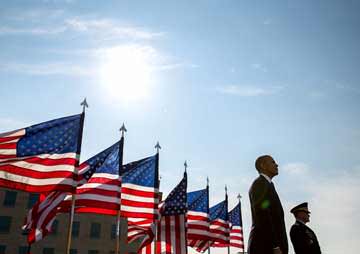What If This Doesn’t Work?
President Obama has committed the United States to another open-ended Middle East war in which the potential for doing harm rivals the possibility of doing good. White House/Pete Souza
White House/Pete Souza
White House/Pete Souza
President Obama has committed the United States to another open-ended Middle East war in which the potential for doing harm rivals the possibility of doing good.
That’s the bottom line from Obama’s sober address to the nation. The president made his decision cautiously, reluctantly, even painfully. But make no mistake: The pledge to “destroy” the Islamic State is a long-term commitment, and success will depend on a host of partners that may be unreliable.
The biggest winner is Syrian dictator Bashar al-Assad, who must have broken out the champagne when the president finished speaking Wednesday night. Obama’s stated policy is that Assad must go, but U.S. military action now promises to make it easier for him to stay.
Expanding the U.S. bombing campaign against the Islamic State into Syria is meant to inflict serious damage on the most capable rebel force seeking to oust Assad’s brutal regime. As Islamic State militants are forced to evacuate territory they now hold, Assad’s army will move in.
In a more perfect world, “moderate” non-jihadist Syrian rebel groups would be the ones to occupy and hold this land. But no such force is presently up to the task. U.S. airstrikes likely will pave the way for Assad — who has used chemical weapons against defenseless civilians — to take much of his country back.
Obama’s plan involves identifying, training and equipping moderate Syrian rebels, but the administration has no illusions that this can be accomplished quickly. Groups such as the Free Syrian Army — which has a long way to go before it is a match for either the Islamic State or Assad’s military machine — may have to content themselves with trying to hold bits and pieces of terrain in the western part of the country until the conflict reaches a point where a political solution is possible. To state the obvious, this could take a while.
To ask the even more obvious: Once you get involved in the Syrian civil war, how on earth do you get out?
The Obama administration’s position is that the United States plans to go after Islamic State fighters in Syria but not to intervene otherwise. Obama’s plan does not contemplate any military action against Assad’s forces. But Syria has an extensive, if aging, system of anti-aircraft weaponry. What happens if one of those missiles is fired at a U.S. warplane? Is the United States then compelled to attack Assad’s air defenses? Do we accept an apology if Assad says “Sorry, my bad” and promises not to do it again?
In fact, won’t all sides try to provoke the United States into doing their dirty work for them? Without much better intelligence about who is who and what is what in a maddeningly complex conflict, the potential for a tragic gap between intentions and outcome is huge.
In Iraq, Obama’s no-boots strategy anticipates that the Iraqi army — which was initially routed by the Islamic State — can somehow be transformed into an effective fighting force. But is this a reasonable expectation or magical thinking?
If Iraqi forces are going to take back and hold the territory that the Islamic State occupies — primarily the part of the country where the Sunni minority lives — the new government in Baghdad will have to be seen by residents as legitimate and inclusive.
Even if this change takes place, the Iraqi military and police will have to be able to exploit the battlefield advantage that U.S. airstrikes provide. To expect a force that recently proved itself incompetent to be changed overnight into a fighting machine is not realistic, I fear.
Then there is the matter of the broad international coalition that Obama has assembled. The NATO allies are no more inclined to send troops than we are. As for neighboring countries threatened by the Islamic State, how many can be trusted to play a truly constructive role? After all, Saudi Arabia — perhaps the key player — has done more than any other country to finance the spread of jihadist philosophy throughout the Muslim world.
Iran is not part of the coalition, but might as well be. Will relations between Washington and Tehran continue to be defined by the nuclear issue? Or does that take a back seat to cooperation in Iraq and Syria?
One more question: What if Obama’s plan doesn’t work? Plan B, I suppose, will be for his successor to figure out.
Eugene Robinson’s e-mail address is eugenerobinson(at)washpost.com.
© 2014, Washington Post Writers Group
Your support matters…
Independent journalism is under threat and overshadowed by heavily funded mainstream media.
You can help level the playing field. Become a member.
Your tax-deductible contribution keeps us digging beneath the headlines to give you thought-provoking, investigative reporting and analysis that unearths what's really happening- without compromise.
Give today to support our courageous, independent journalists.






You need to be a supporter to comment.
There are currently no responses to this article.
Be the first to respond.